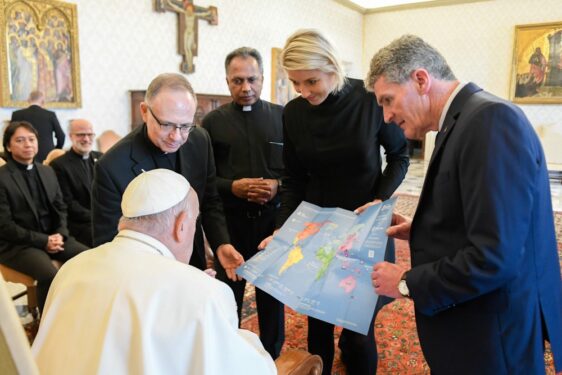
By Carol Glatz
VATICAN CITY (CNS) — True education is accompanying young people to discover and build the common good through academic rigor and serving others, Pope Francis said.
“We need to move from the culture of the ‘I’ to the culture of the ‘we,’ in which a quality education is defined by its humanizing results and not by its economic results,” he told members of the International Commission on the Apostolate of Jesuit Education in a written address given to them during an audience at the Vatican May 24.
The commission is an advisory body to the Jesuits’ Secretariat for Education and focuses on secondary and pre-secondary education rather than universities. The commission reported in 2023 that there are more than 2,300 schools in the Jesuit global network, educating “more than 2 million students, from all kinds of religious, cultural, social and language backgrounds in 5 continents and more than 70 countries.”
In his prepared speech, which was given to the group, the pope wrote that the Jesuits must insist on how indispensable it is for educators to have “a true relationship with the Lord.”
The only way to help share “the treasure revealed in Jesus” with young people and help them “experience his liberating and salvific mystery” is for young people to see in their educators and parents “this relationship with God and a deep respect for others and for creation,” he wrote.
“Our schools must also be educators of educators, teachers of teachers,” he added.
Jesuit schools have allowed the message of the Gospel to be heard by each new generation while also being places of great academic and intellectual rigor, the pope wrote. “But the center has been and must continue to be Jesus. That is why the Jesuits, through the curriculum and school activities, worked so young people could come into contact with the Gospel, with service to others and, therefore, contribute to the common good.”
The Jesuits believe that starting from a young age, people should learn to discover “God present in others, especially in the poor and the marginalized,” the pope wrote. “This is true education, accompanying young people to discover, in service to others and in academic rigor, the building up of the common good.”
As a matter of fact, he wrote, the Global Compact on Education he has promoted aims to revise educational efforts so that young people may be “prepared and begin to change the mentality of an education only for ‘my’ personal success, into the mentality of an education that leads them to discover the true fullness of life, when personal gifts and abilities are used in collaboration with others, for the construction of a more human and fraternal society and world.”
Without the global compact, he wrote, “our world, which already suffers so much violence and polarization, will not be able to create a hopeful future or overcome the serious challenges that affect it and that force us to become more aware that we share a common home.”
Education is a long-term effort that requires patience and an understanding that the end results are not always clear, he wrote. “Even Jesus did not have good results with the disciples in the beginning, but he was patient, and he continues to be patient with us to teach us that to educate is to wait, to persevere and to insist with love.”
